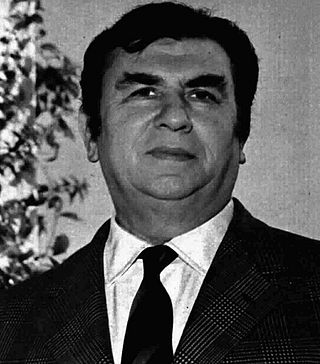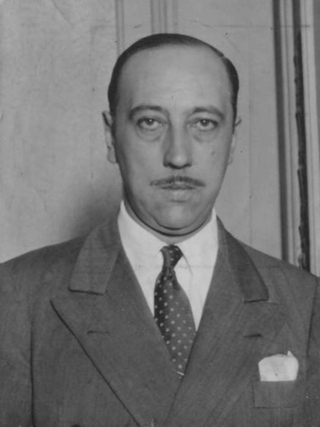Related Research Articles

Corriere della Sera is an Italian daily newspaper published in Milan with an average circulation of 246,278 copies in May 2023. First published on 5 March 1876, Corriere della Sera is one of Italy's oldest newspapers and is Italy's most read newspaper. Its masthead has remained unchanged since its first edition in 1876. It reached a circulation of over 1 million under editor and co-owner Luigi Albertini between 1900 and 1925. He was a strong opponent of socialism, clericalism, and Giovanni Giolitti, who was willing to compromise with those forces during his time as prime minister of Italy. Albertini's opposition to the Italian fascist regime forced the other co-owners to oust him in 1925.

Palmiro Michele Nicola Togliatti was an Italian politician and statesman, leader of Italy's Communist party for nearly forty years, from 1927 until his death. Born into a middle-class family, Togliatti received an education in law at the University of Turin, later served as an officer and was wounded in World War I, and became a tutor. Described as "severe in approach but extremely popular among the Communist base" and "a hero of his time, capable of courageous personal feats", his supporters gave him the nickname il Migliore. In 1930, Togliatti renounced Italian citizenship, and he became a citizen of the Soviet Union. Upon his death, Togliatti had a Soviet city named after him. Considered one of the founding fathers of the Italian Republic, he led Italy's Communist party from a few thousand members in 1943 to two million members in 1946.
Secondino Tranquilli, best known by the pseudonym Ignazio Silone, was an Italian politician, novelist, essayist, playwright, and short-story writer, world-famous during World War II for his powerful anti-fascist novels. Considered among the most well-known and read Italian intellectuals in Europe and in the world, his most famous novel, Fontamara, became emblematic for its denunciation of the condition of poverty, injustice, and social oppression of the lower classes, has been translated into numerous languages. From 1946 to 1963, he was nominated for the Nobel Prize in Literature.

Alberto Pincherle, known by his pseudonym Alberto Moravia, was an Italian novelist and journalist. His novels explored matters of modern sexuality, social alienation and existentialism. Moravia is best known for his debut novel Gli indifferenti and for the anti-fascist novel Il conformista, the basis for the film The Conformist (1970) directed by Bernardo Bertolucci. Other novels of his adapted for the cinema are Agostino, filmed with the same title by Mauro Bolognini in 1962; Il disprezzo, filmed by Jean-Luc Godard as Le Mépris ; La noia (Boredom), filmed with that title by Damiano Damiani in 1963 and released in the US as The Empty Canvas in 1964 and La ciociara, filmed by Vittorio De Sica as Two Women (1960). Cédric Kahn's L'Ennui (1998) is another version of La noia.

La Stampa is an Italian daily newspaper published in Turin with an average circulation of 87,143 copies in May 2023. Distributed in Italy and other European nations, it is one of the oldest newspapers in Italy. Until the late 1970s and early 1980s, when the country underwent a nationalization process, La Stampa and Corriere della Sera were not real national daily newspapers, as their geographical area of circulation was mostly limited to Piedmont for La Stampa and Lombardy for Corriere della Sera; thus, both papers shared a readership that was linked to its place of residence and its social class, mostly from the industrialist class and financial circles. La Stampa has "historically" been Turin's newspaper of record. It is considered one of Italy's leading national newspapers alongside Corriere della Sera, la Repubblica, Il Sole 24 Ore, and Il Messaggero.

Luigi Cervi, better known as Gino Cervi, was an Italian actor. He was best known for portraying Peppone in a series of comedies based on the character Don Camillo (1952–1965), and police detective Jules Maigret on the television series Le inchieste del commissario Maigret (1964–1972).

Pietro Sandro Nenni was an Italian socialist politician and statesman, the national secretary of the Italian Socialist Party (PSI) and senator for life since 1970. He was a recipient of the Lenin Peace Prize in 1951. He was one of the founders of the Italian Republic and a central figure of the Italian political left from the 1920s to the 1960s.

Ernesto Palacio was an Argentine historian and part of a generation of right-wing nationalist intellectuals active from the 1920s. Their ideology is referred to as nacionalismo.
Secolo d'Italia is a daily online newspaper in Italy, published since 1952, formerly supporting neo-fascism. In 2012, it ceased its print edition and continued as an online-only conservative publication.

Liberation Day, also known as the Anniversary of Italy's Liberation, Anniversary of the Resistance, or simply 25 April, is a national holiday in Italy that commemorates the victory of the Italian resistance movement against Nazi Germany and the Italian Social Republic, puppet state of the Nazis and rump state of the fascists, culmination of the liberation of Italy from German occupation and of the Italian civil war in the latter phase of World War II. That is distinct from Republic Day, which takes place on 2 June and commemorates the 1946 Italian institutional referendum.
Mondoperaio is an Italian cultural-political journal that is based in Rome, Italy. The magazine has a socialist stance.

Leopoldo "Leo" Longanesi was an Italian journalist, publicist, screenplayer, playwright, writer, and publisher. Longanesi is mostly known in his country for his satirical works on Italian society and people. He also founded the eponymous publishing house in Milan in 1946 and was a mentor-like figure for Indro Montanelli.
Mario Pannunzio was an Italian journalist and politician. As a journalist he was the director in charge of the daily newspaper Risorgimento Liberale in the 1940s and of the weekly political magazine Il Mondo in the 1950s. As a politician he was a co-founder of the revived Italian Liberal Party in the 1940s and then of the Radical Party in 1955.

Giorgio Pisanò was an Italian journalist, essayist and fascist politician.
Il Travaso delle idee, mostly known as Il Travaso, was a satirical magazine which was in circulation between 1900 and 1966 with an interruption in the period 1944–1946. Its subtitle was Organo ufficiale delle persone intelligenti. The magazine was headquartered in Rome, Italy.

Alberto Cianca was an Italian journalist and anti-fascist politician. He edited several significant publications, including Il Mondo, and served in the Parliament and Senate.
Cantachiaro was an Italian weekly satirical magazine which had a radical anti-Fascist stance. The magazine was in circulation between 1944 and 1948 and was based in Rome, Italy.
Asso di bastoni was a weekly satirical and political magazine which was headquartered in Rome, Italy. It was in circulation between 1948 and 1957. The magazine was the organ of the Repubblica Sociale Italiana which was established by the members of the Italian Social Movement, a neo-fascist political party.

Raffaello Riccardi was an Italian Fascist politician. He was the minister for Exchanges and Currencies of the Kingdom of Italy from October 1939 to February 1943.
References
- 1 2 3 Elisabetta Cassina Wolff (2011). "The meaning and role of the concepts of democracy and corporatism in Italian neo-fascist ideology (1945–1953)". Modern Italy. 16 (3): 297. doi:10.1080/13532944.2010.524887. S2CID 145376470.
- 1 2 "Cinquant'anni di stampa e propaganda della destra italiana (1945-1995)". Radio Radicale (in Italian). 11 February 2020. p. 18. Retrieved 20 July 2023.
- ↑ Carlo Vallauri (2001). "Giovannini, Alberto". Dizionario Biografico degli Italiani (in Italian). Vol. 56.
- ↑ "Alberto Giovannini una firma fuori dal coro". Secolo d'Italia (in Italian). 5 October 2012. Retrieved 20 July 2023.
- ↑ "Pino Rauti". pinorauti.org (in Italian). 13 February 2020. Retrieved 20 July 2023.